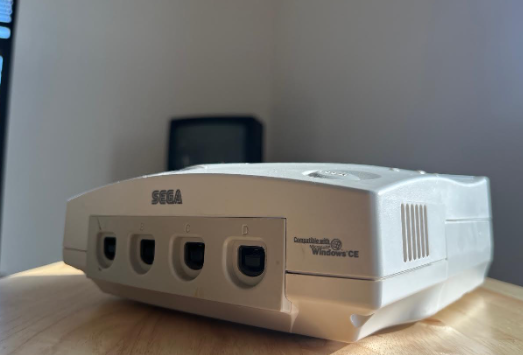25 Years Later, the Dreamcast Still Rules

Image Courtesy of Joey Broom
By Joey Broom
It has been 25 years since the launch of the Dreamcast, the final video game console manufactured and released by Sega. The Dreamcast lasted less than two years in the U.S. market – in 2001, Sega made the shocking decision to end console production and become a third-party developer and publisher. It concluded Sega’s 18-year stint as a console manufacturer, characterized by both the highest of highs and the lowest of lows.
Sega entered the American console market with its Master System in 1986 but struggled to challenge the dominance of Nintendo. It was not until 1991, when it released Sonic the Hedgehog for its subsequent console, the Genesis, that Sega became a force to be reckoned with. Sega was Nintendo’s first legitimate competitor; the playground arguments over whether Mario or Sonic was better became legendary. For a while, the Genesis outsold the Super Nintendo at a two to one ratio.
Then came the Sega CD, a largely useless add-on for the Genesis that cost as much as the Genesis itself and had few games, and then the 32X, a completely useless add-on that barely worked and had even fewer games. Sega followed the 32X with the Sega Saturn, a virtually impossible console for developing games unless you worked at Sega itself. The Saturn tanked, and much of Sega’s market share was devoured by Sony, who entered the foray around the same time with the first PlayStation.
One of Sega’s greatest strengths as a developer is its tendency for wild experimentation and willingness to take risks. Against all odds, Sega decided to take another swing with the Dreamcast. And it was jam-packed with features: built-in internet connectivity, online multiplayer, downloadable content, and music streaming services, to name a few. Nowadays, these are standard features we think nothing of. In 1999? This was revolutionary. The Dreamcast was the first console that made online capabilities the forefront of its design, well before Microsoft, Sony, and Nintendo did so.
Not to mention, few consoles can claim the number of genre-defining classics that the Dreamcast can. Crazy Taxi, Jet Set Radio, and Sonic Adventure oozed a rebellious, anti-authority, countercultural spirit, whereas Shenmue challenged conventional game design with its emphasis on the mundanity of daily life. Rez, Skies of Arcadia, and Space Channel 5 embraced the surreal, while ChuChu Rocket!, NFL 2K, and Phantasy Star Online introduced the masses to the exciting possibilities of online multiplayer. And that’s only to name a few. (Heck, the Dreamcast library is probably still bigger than the PS5 or Xbox Series X|S libraries.)
Unfortunately, despite a successful launch, the Dreamcast failed to maintain long-term interest as the populace’s attention turned to the PS2, Xbox, and GameCube. It only sold 9.13 million units worldwide and nearly bankrupted Sega, forcing the company to withdraw support and restructure itself. But those who bought a Dreamcast refused to part ways with it, and many still use their consoles regularly… including me!
I bought a Dreamcast last year, and I love it. A good chunk of its library isn’t playable on modern consoles, and the online servers for many games remain active. Additionally, many modern ports aren’t perfect, with issues ranging from graphical errors to missing licensed music. (Sonic Adventure’s ports are notoriously terrible.) Playing on a Dreamcast in 2024 is like entering a portal to a simpler time, when the internet was this new, radical concept. The memory card also serves as a portable clock and can store simple minigames. It’s a fun pre-class time-waster!
Jumping to 2024, it seems we’re on the cusp of a Sega renaissance. The company is enjoying levels of success it has not seen in decades: Sonic is re-emerging as a prominent franchise, the previously niche Persona and Yakuza have become multimillion-selling tentpoles, and many classic franchises (among them Crazy Taxi and Jet Set Radio) are seeing new leases of life. As Sega enters a new golden age, it’s worth taking time to remember the greatness of their last gasp as a console manufacturer.







